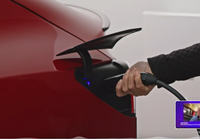The Other Side of the Coin: Exploring the Cons of Electric Vehicles
 In recent years, electric vehicles (EVs) have been hailed as the future of transportation, promising to revolutionize the automotive industry with their environmentally friendly nature and potential to reduce our dependence on fossil fuels.
In recent years, electric vehicles (EVs) have been hailed as the future of transportation, promising to revolutionize the automotive industry with their environmentally friendly nature and potential to reduce our dependence on fossil fuels.
However, amidst all the hype and enthusiasm, it's crucial to acknowledge that like any other technology, electric vehicles come with their own set of drawbacks and limitations. In this article, we'll delve into the cons of electric vehicles, shedding light on aspects that often get overshadowed in discussions about their benefits.
1. **Limited Range Anxiety**:
One of the most significant concerns surrounding electric vehicles is range anxiety. Unlike traditional gasoline-powered cars, EVs have limited driving ranges on a single charge. While advancements in battery technology have extended these ranges in recent years, they still fall short compared to the convenience of refueling at gas stations. According to a study by the American Automobile Association (AAA), range anxiety remains a significant barrier to EV adoption for many consumers, with 58% of surveyed Americans expressing concerns about running out of charge while driving.
2. **Charging Infrastructure Challenges**:
The widespread adoption of electric vehicles heavily relies on the development of robust charging infrastructure. While significant efforts are being made to expand charging networks globally, the infrastructure still lags behind the growing demand for EVs. In rural areas and less developed regions, access to charging stations can be sparse, leading to inconvenience for EV owners. Additionally, charging times remain a concern, with even fast-charging stations requiring significantly more time to recharge compared to filling up a gas tank.
3. **High Initial Cost**:
Electric vehicles tend to have higher upfront costs compared to their gasoline counterparts. While the total cost of ownership over the vehicle's lifetime may be lower due to savings on fuel and maintenance, the initial investment can be a barrier for many consumers. According to data from Kelley Blue Book, the average price of a new electric vehicle in the United States is still notably higher than that of a comparable gasoline-powered car, making it less accessible to budget-conscious buyers.
4. **Battery Degradation and Replacement Costs**:
The lithium-ion batteries that power electric vehicles are known to degrade over time, affecting the vehicle's driving range and overall performance. Factors such as temperature, charging habits, and the number of charge cycles can accelerate battery degradation. While manufacturers strive to improve battery longevity, replacement costs remain a concern for EV owners. A study published in the journal Energy Policy suggests that battery replacement can account for a significant portion of the total ownership cost of an electric vehicle, potentially offsetting the savings achieved through fuel and maintenance.
5. **Environmental Impact of Battery Production**:
While electric vehicles produce zero emissions during operation, the environmental impact of battery production cannot be overlooked. The mining and processing of lithium, cobalt, and other rare earth metals required for battery manufacturing have significant environmental consequences, including habitat destruction, water pollution, and carbon emissions. A report by the European Commission's Joint Research Centre highlights the environmental challenges associated with raw material extraction for electric vehicle batteries, calling for sustainable practices to mitigate these impacts.
6. **Limited Model Variety and Availability**:
Despite growing interest in electric vehicles, the market still offers a limited variety of models compared to traditional gasoline-powered cars. This limited selection, coupled with production constraints and supply chain challenges, can result in long wait times for certain EV models. Moreover, access to electric vehicles may be restricted in some regions due to regulatory policies or market preferences, limiting consumer choice and adoption.
7. **Challenges in Recycling and Disposal**:
As electric vehicles become more prevalent, the issue of recycling and disposal of end-of-life batteries becomes increasingly important. While efforts are underway to develop recycling technologies for lithium-ion batteries, the process remains complex and expensive. Improper disposal of spent batteries can pose environmental and safety hazards, potentially leading to soil and water contamination. Addressing these challenges requires coordinated efforts from policymakers, manufacturers, and recycling industries to establish efficient and environmentally responsible battery recycling systems.
In conclusion, while electric vehicles offer promising solutions to address climate change and reduce dependence on fossil fuels, it's essential to recognize and address the challenges and limitations associated with their adoption. From range anxiety and charging infrastructure issues to high initial costs and environmental concerns, the cons of electric vehicles highlight the need for continued innovation and investment in sustainable transportation solutions. By acknowledging these drawbacks and working towards solutions, we can pave the way for a more sustainable and inclusive future of mobility.
Sources:
- American Automobile Association (AAA) - https://newsroom.aaa.com/2019/05/range-anxiety-cut-in-half/
- Kelley Blue Book - https://www.kbb.com/car-news/electric-car-cost/
- Energy Policy Journal - https://www.sciencedirect.com/science/article/pii/S0301421513008179
- European Commission's Joint Research Centre - https://ec.europa.eu/jrc/en/publication/eur-scientific-and-technical-re…
- National Center for Sustainable Transportation - https://escholarship.org/uc/item/09v319w5
Mind Detour offers humorous, educational and interesting articles and videos to detour your mind from the everyday grind.
Be sure to follow us on Twitter and like our page on Facebook.
Thank You for visiting my site, I really appreciate it! Please do me a huge favor and share my articles with your friends on social media.



